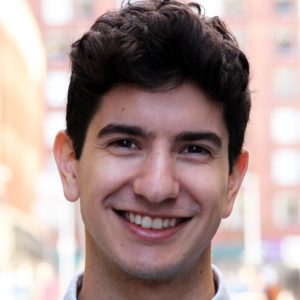In a continuation of last year’s seasonal series, this winter, each PCUR will interview a Princeton alumnus from their home department about his/her experience writing a senior thesis. In Looking Back on Undergraduate Research: Alumni Perspectives, the alumni reveal how conducting independent research at Princeton influenced them academically, professionally and personally. Here, Ellie shares her interview.
~~~~~

Jacob Schatz graduated from Princeton in 2015 with a degree in Psychology. After graduation, he worked as a lab coordinator at the Temple University Infant and Child Lab until this past fall, when he began graduate school in New York University’s Applied Psychology program. I had the privilege of talking with Jacob about the independent work in psychology that he conducted at Princeton. He provided the following insights on how his interests in psychology and education inspired his senior thesis research on how children learn from storybooks and his professional trajectory beyond Princeton:
Why did you decide to major in Psychology?
I have always been fascinated by the human mind, and my first few classes—Developmental Psychology, Psychology of Social Influence—reinforced my passion.
Can you explain your thesis research? How did you decide on your research question?
My thesis research investigated what and how children learn from pedagogical narratives—stories with a clear moral. I was particularly interested in whether fantasy elements like talking animals, magic wands, and an abstract lesson would increase the “cognitive load” for the child reading the book. More specifically, while fantasy elements would improve narrative recall and comprehension, they would interfere with the child understanding the moral of the story. My research question was primarily inspired by my work with Caren Walker at Alison Gopnik’s Cognitive Development Lab at University of California, Berkeley, as well as a final paper for my Psychology of Social Influence class, which took me behind the scenes at Nickelodeon and promoted me to think about educational storytelling on television.
What was the hardest part of your independent work?
The hardest part of my independent work was developing a research idea well before my assignment to a thesis adviser. I began collecting data for my empirical study in the summer before senior year, which required that I fully conceptualize a research design and submit a study proposal to the Institutional Review Board (IRB) to be ready for data collection in the summer. And, in my case, my thesis adviser Dr. Casey Lew-Williams hadn’t even begun working at Princeton yet! But Casey guided me through my work even over the summer and was—and still is—an immeasurably valuable mentor to me, so it all worked out.
Were there any experiences in your first few years at Princeton that were particularly helpful in preparing you for independent work? What advice would you give to current students to help them prepare for thesis research?
My experience working at UC Berkeley as an intern in Alison Gopnik’s lab was very helpful for me in shaping my research interests and exposing me to the immense groundwork needed to execute a single study. In terms of preparing for thesis research, if you intend to conduct behavioral research, particularly with younger kids and not collecting data through surveys, you will want to begin conceptualizing your work sometime in the middle of junior year. Befriend the IRB and your IRB representative in your department, they are critical to your research. And they’re also wonderful people! Plan to have data collection done well before the end of your first semester of senior year. And design a study with as specific a research question as possible, with as few independent variable manipulations as possible, to minimize the actual time it will take to collect data both per session and across sessions. That said, if you are reading this and feel wholly unprepared, don’t fret! Always remember your research interests are worthwhile and you will find a way to make it work!
How has your independent work shaped your career since Princeton?
My independent work on educational stories brought me to Philadelphia to work as a lab coordinator in Dr. Kathy Hirsh-Pasek’s Temple University Infant and Child Lab. I worked on this massive multimedia vocabulary intervention investigating how a combination of book reading and play might help preschoolers in Head Start schools acquire vocabulary. That work inspired me to apply to Ph.D. programs in Psychology and Education where there were faculty whose interests aligned with mine. In Fall 2017, I began my graduate career in the Applied Psychology program at NYU, and under the mentorship of Dr. Catherine Tamis-LeMonda I am pursuing my interests in parent-child language interactions during play. Drs. Lew-Williams and Hirsh-Pasek have been, and will continue to be, invaluable mentors to me—and it seems I have a thing for advisers with hyphenated names.
—
It was incredibly enlightening to talk with Jacob and hear about where an interest in psychology, and specifically one within the field of developmental psychology that I am studying, can lead both at Princeton and beyond. Even though Jacob’s specific research is in psychology, his advice to use independent work to build off of and expand previous projects or essays that were particularly interesting, to create a close relationship with your adviser, and to start thinking about your research as soon as possible (easier said than done!) can be applied to research in any field.
— Ellie Breitfeld, Natural Sciences Correspondent

